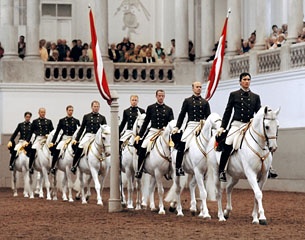
The Spanish Riding School has been submitted to the UNESCO world heritage list of intangible cultural heritage of humanity at the 2015 UNESCO conference in Windhoek, Namibia, which takes place on 30 November - 4 December 2015.
On Wednesday 2 December 2015, the tradition of the classical art of riding and the High School of Horsemanship of the Spanish Riding School was admitted to the UNESCO world heritage list of intangible cultural heritage of humanity.
For the list of intangible cultural heritage of humanity this year, 34 artistic forms, traditions and customs were nominated. After an intensive evaluation process, the Intergovernmental Committee took the decision to admit the Classical Art of Riding of the Spanish Riding School. The Intergovernmental Committee comprises 24 elected representatives of the signatories. In order to suggest a cultural art for the international UNESCO list of Intangible cultural heritage, it is an obligatory prerequisite to be admitted to the national register.
The Spanish Riding School in Vienna is the oldest Riding School worldwide, which has been practising and maintaining the Classical Art of Riding in the Renaissance tradition of the High School for 450 years. The knowledge of the Classical Art of Riding is being transmitted orally from one generation of riders to the next and is being presented to the public in national and international riding performances. For hundreds of years, they have been cultivating an art of riding with a horse especially bred for that purpose – the Lipizzaner - an art of riding, which had already been in its heyday in the antique of the ancient Greek.
The UNESCO list already comprises over 300 traditions from all world religions – among others the Peking opera, the Spanish Flamenco, the Mongolian Naadam Festival, the Iranian tradition of carpet making, the Colombian Marimba music and the Chinese acupuncture, now also comprises three Austrian traditions. In the year of 2015 the Art of Riding of the Spanish Riding School was added to the list
Since 2003, the variety of lived tradition has also been recognised at an international level. With the visualization of and the awareness creating for “intangible cultural heritage” we make a valid contribution to preserve this heritage. These oral traditions contribute to forming identities for communities – which sometimes has a much greater effect than historic buildings or landscapes could ever have. Regional customs and local knowledge have gained importance especially in times of globalization. Up to now, 163 states have ratified the UNESCO agreement to preserve the immaterial cultural heritage.
Related Links
French Equitation Inscribed on the UNESCO Intangible Heritage Representative List
Bernard Maurel Appointed Head of French Equitation UNESCO Project and Documentation Department
History of French Equitation - Part I: Dressage a la Francaise